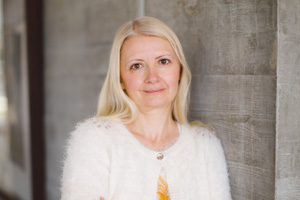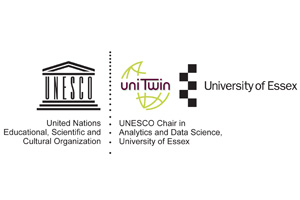
Professor Maria Fasli
The University of Essex is set to join the UK’s growing UNESCO university network after being invited by the UNESCO Director General to establish the first UNESCO Chair in Analytics and Data Science.
This work will be led by Professor Maria Fasli, Director of the University’s Institute for Analytics and Data Science (IADS), who said: “The UNESCO Chair seeks to highlight the critical role that data plays in promoting equality and sustainable development.
"Data underpins almost every aspect of human life and there is huge potential for unlocking its benefits for economic growth. However, in developing and transitioning countries there is an acute lack of skills in data science and analytics.
"Through an extensive research and capacity building programme, working with collaborators and experts from around the world, the UNESCO Chair will help address this skills gap by developing and strengthening the knowledge base. The Chair seeks to improve the application of analytics techniques at the organisational and governmental level, promoting access to data and information but also facilitating data literacy, improving people’s participation in public life, their ability to make informed decisions, and to hold organisations and institutions to account. Such an injection of skills will help develop strong and self-reliant knowledge economies, support growth, enable the delivery of better services to citizens and enhance people’s lives.”
The focus of the UNESCO Chair will be to develop national and international research capacity in analytics and data science. In particular, the Chair is looking to support the development of the knowledge base and knowledge economies of developing countries. The UNESCO Chair’s activities will include research on new techniques for the collection, analysis and dissemination of data which would help government organisations develop better systems for data collection and dissemination and support the ‘counting of the uncounted’ by providing data on marginalised communities.

A second key objective is to improve workers’ data literacy, capacity and skills through training, knowledge exchange and outreach activities. Indeed, the demand for data specialists is projected to grow worldwide by 160% between 2013 and 2020. As developing economies grow, digital services and information will play a pivotal role.
Welcoming Professor Fasli’s new role, University of Essex Vice-Chancellor Professor Anthony Forster said: “The University of Essex is absolutely delighted to be joining UNESCO’s prestigious Universities Network. Essex has an excellent track record in data analytics and data science research and we are committed to providing a high-quality, transformative education experience. We are really looking forward to working with UNESCO to help address the challenge of helping developing and transitioning countries to gain the data science and analytics skills they need for the 21st century.”
The UK National Commission for UNESCO, which is the central hub for UNESCO-related matters in the UK, supported Professor Fasli through the rigorous application process to establish the UNESCO Chair.
The UK National Commission for UNESCO’s Higher Education Director, Professor Kiran Fernandes, said of the announcement: “The international development community are exploring how big data and the data revolution can be harnessed for sustainable development through facilitating data-driven, evidence-based decision-making, accountability and results monitoring. Professor Fasli’s critical work in this space is working to strengthen the contribution of data to sustainable development at both the micro and macro level through data literacy programmes and state-level capacity building. By collaborating with other members of the global UNESCO Chair’s network she will be helping deliver on UNESCO and the international community’s ambitious Sustainable Development Goals and in this, we wish her every success.”
The University of Essex is at the cutting edge of advances in big data and smart analytics with over £22 million in research funding in this area. Essex hosts the UK Data Archive (UKDA) which manages thousands of datasets, and the Institute for Social and Economic Research (ISER). UKDA also provides the Administrative Data Service for ESRC’s Big Data Network. Essex leads the ESRC Business and Local Government Data Research Centre while the recently-founded Institute for Analytics and Data Science brings together expertise from across disciplines from computer science and statistics, business and finance, to ethics and human rights, and the social sciences.